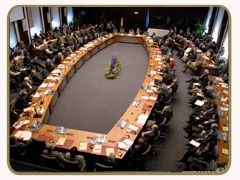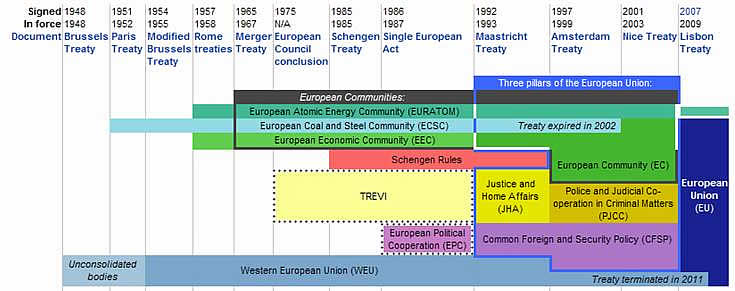| LISBOAN – Erasmus Academic Network |
LISBOAN (Linking Interdisciplinary Integration Studies by Broadening the European Academic Network aims to strengthen cooperation between institutions of higher education and research in Europe with a view to teaching and researching the Treaty of Lisbon, the European Union's legal foundation since December 2009 |
| Learning from the EU Constitutional Treaty |
|
| Two Years after Lisbon: The Commission's view |
CEPS facilitated 1 December 2011 the event " Two Years after Lisbon: The Commission's view", where Maros Sefcovic, Vice-President of the European Commission responsible for
Interinstitutional Relations and Administration, speeched on the fast changing situations and dynamic expectations in relation to the Lisbon Treaty. |
| eur-lex, The Treaty of Lisbon |
|
| October 2010 |
Flowchart of revision procedures under the Treaty of Lisbon (CEPS) |
| 12 October 2010 |
The role of he European Parliament |
| 24 September 2010 |
A Second Look at the Institutional Innovations (EPC, Egmont, CEPS) |
| 25 February 2010 |
Implementing Lisbon: The First Steps (CEPS) |
| December 2009 |
The Lisbon Treaty entered into force |
| November 2009 |
Two new leaders search job description (CEPS) |
| 19-10-2009 Letter to the President of the Czech Republic |
Europe needs the Treaty soon |
| 19-06-2009 Czech Presidency rounds off European Council with success |
Chaired by the Czech Presidency, the European Council gave the green light to the guarantees for Ireland so that a new Irish referendum on the Lisbon Treaty can take place. The Council also agreed on the new European Commission leader; it found consensus on conclusions concerning climate change and reached political agreement on the new European framework for financial supervision. The Czech Presidency brokered the wording of Irish guarantees that are acceptable for Ireland as well as for the other Member States – this is a major success and good news for the whole of Europe.It is a clarifying text that does not amend the Lisbon Treaty. The guarantees will not lead to a re-opening of the process of ratification. The guarantees address tax issues, the neutrality of Ireland and social affairs. However, they relate not only to Ireland - for instance in the tax area, they will be relevant for other Member States as well.It is a legally binding decision of the heads of state and government fully in compliance with the Lisbon Treaty. It will enable Ireland to set a date for the referendum and, in case of a positive result, lead to a timely adoption of the Treaty. This represents an important step toward increasing the efficiency of an enlarged EU as well as institutional stability. |
| Dick Roche 5 March 2009 |
The EU is Unique Because it is Founded on Democracy |
| Andrew Moravcsik |
The Myth of Europe's "Democratic Deficit" |
Sebastian Kurpas &
Piotr Maciej Kaczyński 15-12-08 |
Inching towards a second Irish referendum |
| John O'Brennan (CEPS) October 2008 |
Ireland & the Lisbon Treaty: Quo Vadis |
| Millward Brown IMS September 2008 |
Post Lisbon Treaty Referendum |
| CEPS / EPIN September 2008 |
Ratification of the Lisbon Treaty. Ireland is not the only problem |
| Clingendael paper July 2008: |
The Irish 'No' |
| John Bruton 20-06-08: |
Ireland's vote on the Lisbon Treaty - What does it mean? |
| Jurgen Habermas 16-06-2008: |
Ein Lob den Iren |
| FeelingEUROPE Foundation June 2008: |
The splits of European democracy |
| Andrew Moravcsik 2008: |
The European Constitutional Settlement |
| European Parliament 20-02-08: |
Member States should ratify it by the end of this year, to pave the way for the June 2009 European elections, said the European Parliament in an own-initiative report adopted with 525 votes in favour, 115 against and 29 abstentions. Members nonetheless voice some concerns, notably about exceptions made for some countries. |
| NGIZ 15-02-08: |
Lecture Jan Rood: "EUROPA, The Reform Treaty, A Step Forward".
The Lisbon Treaty is to consider as a typical European Treaty, realized with some fear as a driver and through horse-trading activities.
Institutional balance is under pressure. The treaty is very complicated.
Three types of presidencies asks for intense coorporation and Foreign Affairs department gets its own diplomatic service.
In short, a large number of new rules. Rules made by the EU, the EU-countries and the citizens. In the near future it will become a tight period. Positive points are the reform of the institutions and the instrument of card-procedures. However, 33 points of attention stay to solve. |
| Head of States 13-12-2007: |
Signing of European Reform Treaty (in Lisbon) |
| CEPS: |
Lisbon relaunched |
| German law journal: |
Postconstitutional Treaty |
| Joint study CEPS/EPC/EGMONT: |
Treaty of Lisbon: Implementing the institutional Innovations
The Lisbon Treaty aims primarily to reform the institutions, not the policies, with the exeption of foreign policy. The presidents of the Council and the Commission with the double-hatted Hogh Representative for the CFSP/Vice President of the Commission will form a new EU "troika". The problem, however is that the Treaty does not provide well defined borders between the competences and the roles of these leading positions.
The President will play a hybrid role with elements both of rotation and permanence. In his view, the consequences of this new arrangement are largely unpredictable for the unity of a presidency will be undermined and its political responsibility diluted.
It was pointed out that the two most important changes related to the Commission from the failed draft Constitutional Treaty have been incorporated into the Lisbon Treaty. The first reduces the College in size to 2/3 of all member states by 2014, based on a 'strict equal rotation' principle. And in the second change, the Commission President will be elected by the EP, although the President was de facto elected in 2004, and the treaty simply formalises the status quo.
(source "CEPSNews" Januari 2008).  ................................... ................................... ................................... ...................................
"FeelingEurope" was present at the presentation of the three Brussels-based think-tanks. That presentation was held in palais d'Egmont in Brussels (chair mr. H. Onno Ruding) in presence of about 250 participants. In fact there are two treaties: a Treaty on the EU, which contains most of the institutional provisions and a second one on the functioning of the Union. The three denk tanks held their presentation at the d'Egmont palace in Brussels (chair mr. H. Onno Ruding). Potential problems were highlighted and where possible, ways to avoid their negative effects were suggested. Seven main institutional and policy domains were analyzed. The success of institutional innovations depends also on the way in which the provisions are implemented.
The publication have been intensivly debated. The three institutes hope that the publication will find some resonance amoung political leaders and public opinion. |
| Instituut Clingendael 18-09-2007 : |
|
| CEPS: |
|
| Prime minister José Sócrates: |
|
| Public resonance: |
|
| EUROPEAN UNION |
|
| GERMAN PRESIDENCY |
|
| THE NETHERLANDS 23-05-2007 |
|
| José Manuel BARROSO: |
|
| Action Committee for
European Democracy
(ACED) |
|
| Jürgen Habermas 23-03-07 IGC |
|
| Portuguese Presidency |
|
| Andrew Moravcsik 23-01-2007 |
|
| Jurgen Habermas |
|
 ...................................
................................... ...................................
...................................
